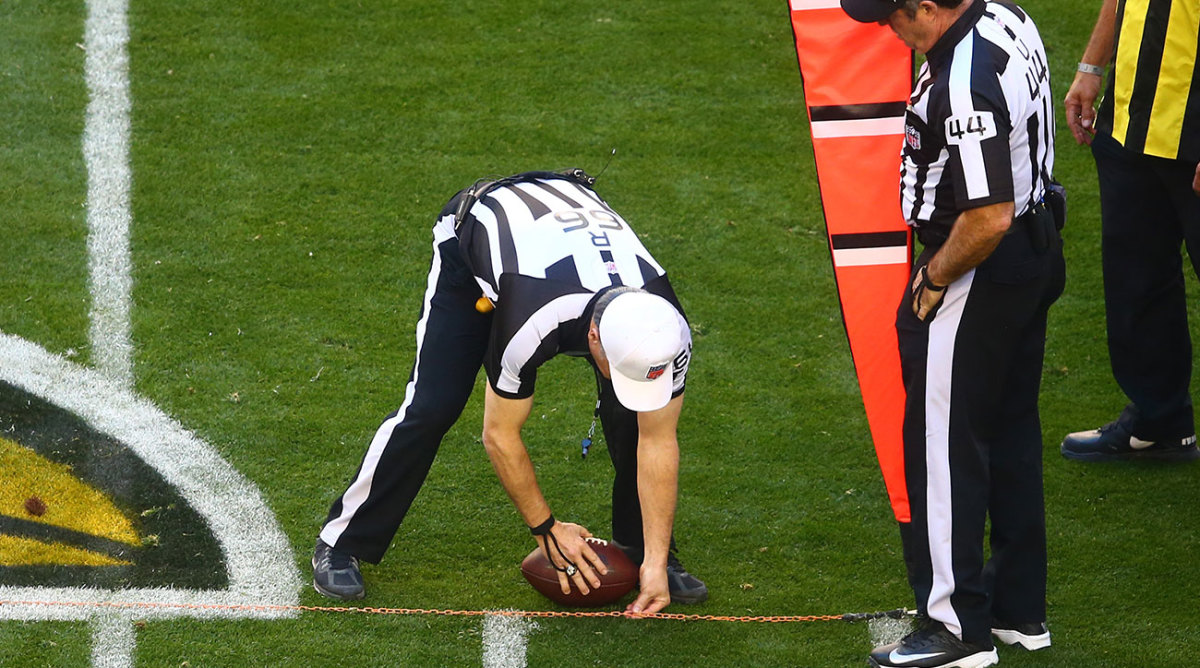Using a Chip in the Ball to Measure First Downs Won’t Solve the NFL’s Problems

Welcome to Bad Takes Week, where MMQB staffers have been asked to expand upon some of their worst football takes. Keep an eye out for more of these throughout the week, and every story is posted here.
America’s true sporting pastime is complaining about referees. Naturally, plenty of fans would be drawn to any scheme that removed those fallible humans from the game as much as possible. I’m not sure there’s an area of greater interest within that realm than marching the chain gang into Roger Goodell’s office and telling them to pack their bags and make way for the robots.
Isn’t this one of the biggest fights in America in 2023? Companies looking for ways to replace human workers with machines? Well, count me on the side of the humans.
I know everyone is obsessed with the idea of using a computer chip in the ball to replace what feels like an archaic practice of determining first downs. But I’m here to tell you it’s going to be a disaster. I’m not saying it won’t happen, of course. I’m saying when it inevitably does, it will make you, and everyone around you, miserable.

This has been a popular idea for years now, but the movement really picked up steam during last season’s playoffs. First, during the Ravens-Bengals wild-card game, the Next Gen Stats Twitter account casually let slip that Tyler Huntley brought a ball within 0.6 yards of the goal line. This brought forth a mix of confusion and wonderment.
Then, during Super Bowl week, Sean Payton gave an interview with The Ringer’s Kevin Clark in which he extolled the virtue of the chips already all over the field. Not to dismiss Payton (who is passionate enough about this to have had an example of the chip in his pocket that day), but as a general rule, if it was that great, they would be doing it already.
I know it sounds nice in theory! Ball travels 10 yards, as measured by laser or computer chip or whatever technology is available; ref signals first down. But I remain, sadly, hung up on the drawbacks.
For one, a first down is not always simply about where the ball reaches. It’s often about where the ball is when forward progress is stopped or a knee is down. Think about a QB sneak, or any running play up the middle that results in a pile of bodies obscuring the refs’ (and cameras’) views of … everything. Sure, it sounds swell to envision a computer telling us exactly where the ball is. But it’s going to be very hard to determine when somebody’s knee (or forearm or shin) was down, and how that corresponds to the end of the play.
And while I love accuracy, I fear that once the world knows what level of precision is possible, there will be pressure to use it on every single play.
Our old pal Alex Prewitt wrote an interesting story in November 2020 about the people who work the chain gang, with all sorts of details about the job. One thing he noted was, “With officials now seemingly defaulting to exact yard lines when spotting the ball on first down, the yard-to-gain is easier to eyeball.”
Won’t it be hard to continue that practice once a chip can tell us more about the ball’s precise coordinates? Won’t there be a temptation after a team picks up a third-down conversion to place the ball at the 36-yard, 1-foot, 3.478256-inch line and force them to go exactly 10 yards from there? And then won’t there be pressure on the ref to put it at that exact spot the chip says, to the inch, after every play is dead? How exactly will they do it? And how long will it take?
It seems like any time a sport introduces new ways to use replay review, it only creates more questions. It’s no accident the “What is a catch?” debate became an Abbott and Costello routine after we started slowing things down frame by frame. The thought of introducing first-down lasers reminds me a bit of the unintended consequences MLB encountered when it introduced replay into tag plays at bases and was forced to start examining minor, momentary overslides. I’m thinking back to NBA playoff and NCAA tournament games bogged down by debates amounting to, Well he knocked the ball out of bounds, but this other guy’s hand was between his hand and the ball, so now we have to think differently about the way we’ve reffed basketball for the last 100-plus years.
Implementing this use of tech on the most basic element of a football game, making it necessary on nearly every play, could slow things down more than icing the kicker.
I’m sure some parts of the game will be improved if refs have access to the chip data while they make decisions. Bills fans may wish we had a chip in the ball the afternoon of the Music City Miracle. It sounds great for those QB sneaks where Cam Newton would leap over the pile at the goal line, even if it seems like less of a help on the Jalen Hurts tush push.
But there will be complaints, and controversy, and delays, and potentially old cranks yelling that life used to be better. Possibly enough that you’ll long for the days when a ref watched a play in real time, spotted the ball where they thought it belonged and could be challenged by coaches for one or two egregious mistakes per game.
The last time The MMQB ran Bad Takes Week, I went the safe route: an opinion I had about something occurring in the present (ties are good and fun, which I still stand by). This time I’m taking a much bigger risk: predicting how we’ll feel in the future. This has a significant chance to haunt me in 30 years, though it remains possible the old web will be dead, Google search will be an unusable mess of AI spambots far more interested in selling you sentient computerized body parts than making you read text with your human eyeballs, and nobody will remember a thing I’ve ever said. Knock on wood, I guess.
But if this somehow comes up and makes me look bad, just remember I tucked this bad boy into Bad Takes Week.
Maybe I’m wrong. Maybe we’ll get to a day when “the yellow line is unofficial” no longer has to be said, when it could actually be superimposed on the turf to help ballcarriers on the field and fans in the stands get a better view.
All I know is whenever there is an issue involving measuring the spot, a cavalcade of people rushes in to say, “Just put a chip in the ball already,” and my knee-jerk instinct is to think, Be careful what you wish for.
Sure, things might seem silly now, but it may be better than the alternative.
